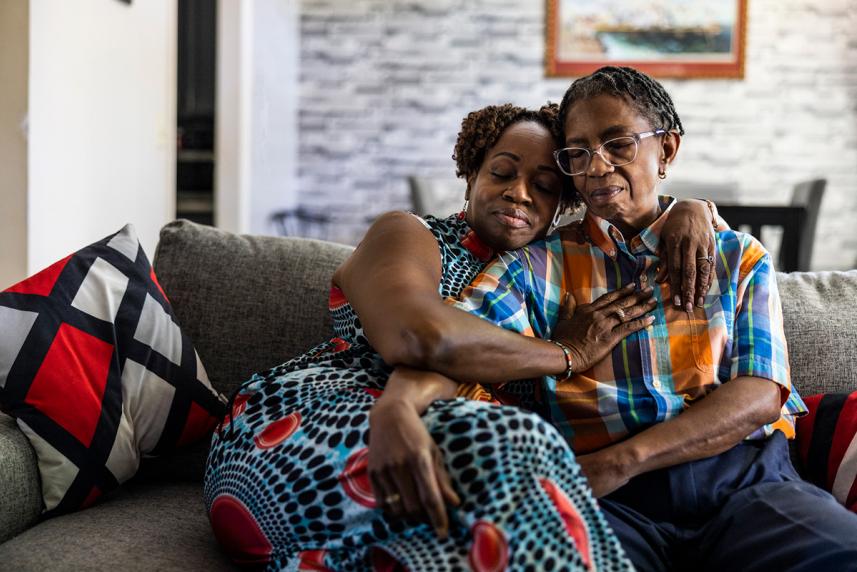
Sign up for our brain fitness newsletter and get research-backed tips and activities delivered straight to your inbox.
Take these seven steps to make your home comfortable and safe — now and for the future.

An early Alzheimer’s diagnosis is life-changing, whether it happens to you or someone you live with, such as a spouse or an elderly parent. The condition starts out slowly, with a bit of forgetfulness or confusion, but it gets worse over time.
According to the Centers for Disease Control and Prevention (CDC), Alzheimer’s is the most common type of dementia. It affects the parts of your brain that control thought, memory, and language. Eventually it can keep you from carrying out simple, everyday activities.
There’s a good chance you or your loved one won’t immediately notice any big differences. “Alzheimer’s spreads slowly through the brain over 5 to 15 years, or even longer,” says Catherine Madison, M.D., a neurologist in San Francisco who specializes in Alzheimer’s.
So, you or your loved one will still have time to do the things you enjoy. “The important thing is to maintain a good quality of life now — and plan for the future.”
At the top of your to-do list: Make a plan for long-term safety in your home, says Dr. Madison. To do that, ask yourself these seven important questions following a diagnosis. (Your answers can help you figure out what you need to do to stay safe — or keep your loved one safe — in the months and years ahead.)

Sign up for our brain fitness newsletter and get research-backed tips and activities delivered straight to your inbox.
Like lots of people, you’ve probably collected too much stuff — and that can pose a safety hazard.
Action plan: Enlist a friend’s help for a clearing-out party. Keep a couple of special collectibles and pack up the rest to give to relatives or donate to charity. Too tough parting with special mementos? Take pictures of them on your smartphone to scroll through and enjoy when you want to.
Attack that clutter, too. Lots of electric cords? Get help tucking them away safely where you can’t trip over them. Glass patio doors? Put a fun sticker at eye level to keep you from walking into them. Piles of magazines? Clear them out. Then sit back and enjoy your new clutter-free living space.
One study found that nearly 78% of homes with older adults had loose throw rugs, with curled carpet edges in more than 35%.
One of the most dangerous spots for a throw rug is the hallway, a location with an increased risk of falling, which can lead to a hip fracture.
Action plan: Recruit a friend or family member to help you remove all throw rugs from your home. If they’re still in good shape, donate them, give them away, or sell them at a yard sale. Bonus: Your floors will likely be easier to keep clean now!
According to the CDC, bathrooms are a particularly dangerous room in the house. In fact, 50% of all home injuries occur there.
Action plan: Consider adding safety measures such as nonskid bathmats and easy-to-install grab bars in the shower and beside the toilet. You can order these items online or purchase them while on a shopping trip with a friend.
Learn about ways to build and maintain your brain health without having to leave your home. Where to start? Brain Fitness News. Sign up for our newsletter today!
Extreme heat from stovetops and ovens. Sharp corners you can run into. Utensils that might be dangerous under certain circumstances. The kitchen is one of the spots in your home that might require the most tweaking.
Action plan: Enlist the help of a family member or friend (or hire a handyman) to install safety knobs on the stove, and consider disconnecting the garbage disposal. Now might also be a good time to install locks on cupboards that contain cleaning supplies, knives, medications, and matches. You or your loved one might not need these precautions right now, but it’s good to be prepared for the future.
The Alzheimer’s Association points out that nighttime can be scary for those with this condition. If you’re worried that you or your loved one might wake up in the dark, feeling afraid or confused — or experience a medical problem in the middle of the night — now’s the time to start planning.
Action plan: Have a bedside lamp within arm’s reach, and consider using a nightlight too. That can help your loved one feel less scared of the dark. Keep the bedroom floor clear of tripping hazards such as cords, shoes, or clothes. Be sure the path to the bathroom is also clear and well lit to make middle-of-the-night bathroom trips safer.
A smartphone or tablet makes it easy to stay in touch with your family. You can text, call, or email to check in at any time. Keep your phone with you during the day so it’s always nearby. You can even charge it next to your bed at night.
Another idea? Try a smart speaker, which is like having your own (virtual) personal assistant. “I care for elders who feel more secure having a smart speaker,” says Elizabeth Landsverk, M.D., a geriatric specialist in Burlingame, California. “It’s a great way to feel connected and get help if you need it.” These devices allow you to use voice commands to do things you might normally do on a phone, tablet, or computer.
Action plan: Interested in a smart speaker? Check out brands such as Amazon Echo, Google Nest Mini or Sonos Era 100. In addition to helping you feel connected, smart speakers can also help you turn the lights on and off, adjust the thermostat, and even remind you of appointments or help you find your keys.
“Look at the big picture,” says Dr. Madison. “If you’re living in a three-story house, your most important safety concern is the risk of falls on steps or stairs. You need to find another home or figure out how to live on one level.” This is true whether your spouse was diagnosed with Alzheimer’s or you are the one with an early diagnosis.
Action plan: You don’t have to sell your house tomorrow, but it’s important to start talking it over with family and close friends. Is there someone who could help you put your property on the market? In any case, be prepared for change somewhere down the line. At some point, your loved one with Alzheimer’s may need more help than you’re able to provide.
Something you can explore on your smartphone or computer in your clutter-free living room? BrainHQ, a brain-training program designed by leading scientists that rewires the brain to help you think faster, focus better, and remember more. And it may be included at no cost with your Medicare Advantage plan. Check your eligibility today.
Additional sources:
Alzheimer’s basics: Centers for Disease Control and Prevention
Bathroom safety for Alzheimer’s patients: Centers for Disease Control and Prevention
Study on home safety for older adults: Journal of Injury and Violence Research
Benefits of using a smart speaker: AARP
Sleep issues for people with Alzheimer’s: Alzheimer’s Association